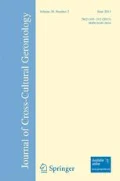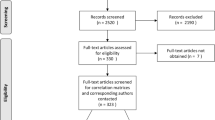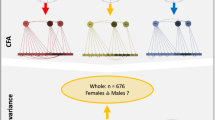Abstract
The structure and organization of cognitive abilities has been examined across the life span. The current analysis had three specific aims: (1) test the factor structure of a broad cognitive ability battery across three age groups; (2) examine differences in the pattern of factor covariation across age groups; and (3) examine the pattern of factor mean differences across age groups. A sample of 512 older African Americans (mean age = 66.6 years, 25.4% male) from the Baltimore Study of Black Aging was administered a battery of cognitive tests assessing the domains of perceptual speed, verbal memory, inductive reasoning, vocabulary, and working memory. Factor models were estimated separately in middle-age adults (50–59 years, n = 107), young-old adults (60–69 years, n = 198), and old-old adults (70–79 years, n = 207). There was loading invariance across the three age groups that suggests that the selected tests measured cognition similarly across age. There was no evidence of dedifferentiation across increasingly older age groups. Factor mean differences were observed with the middle-age group having significantly higher factor means than the young-old and old-old groups; however, there was only one factor mean difference between the young-old and the old-old groups. The results suggest that a pattern of dedifferentiation of cognitive abilities does not exist within this sample of older African Americans and that the 60–69 year age range may be a critical period for cognitive decline in this population.
Similar content being viewed by others
References
Anstey, K. J., Hofer, S. M., & Luszcz, M. A. (2003). Cross-sectional and longitudinal patterns of dedifferentiation in late-life cognitive and sensory function: The effects of age, ability, attrition, and occasion of measurement. Journal of Experimental Psychology. General, 132, 470–487. doi:10.1037/0096-3445.132.3.470.
Arbuckle, T. Y., Gold, D., & Andres, D. (1986). Cognitive functioning of older people in relation to social and personality variables. Psychology and Aging, 1, 55–62. doi:10.1037/0882-7974.1.1.55.
Baltes, P. B., Cornelius, S. W., Spiro, A., Nesselroade, J. R., & Willis, S. L. (1980). Integration versus differentiation of fluid/crystallized intelligence in old age. Developmental Psychology, 16, 625–635. doi:10.1037/0012-1649.16.6.625.
Baltes, P. B., & Lindenberger, U. (1997). Emergence of a powerful connection between memory and cognitive functions across the adult life span. A new window to the study of cognitive aging? Psychology and Aging, 12, 12–21. doi:10.1037/0882-7974.12.1.12.
Baltes, P. B., & Mayer, K. U. (1999). The Berlin aging study: Aging from 70 to 100. New York: Cambridge University Press.
Baltes, P. B., & Willis, S. L. (1982). Plasticity and enhancement of intellectual functioning in old age: Penn State’s Adult Development and Enrichment Project (ADEPT). In F. I. M. Blanchard-Fields, F., & Chen, Y. (1996). Adaptive cognition and aging. The American Behavioral Scientist, 39, 231–248.
Barrett, T. R., & Watkins, S. K. (1986). Word familiarity and cardiovascular health as determinants of age-related recall differences. Journal of Gerontology, 41, 222–224.
Birren, J. E., & Morrison, D. F. (1961). Analysis of the WAIS subtests in relation to age and education. Journal of Gerontology, 16, 363–369.
Blum, J. E., & Jarvik, L. F. (1974). Intellectual performance of octogenarians as a function of education and initial ability. Human Development, 17, 364–375.
Brandt, J. (1991). The Hopkins Verbal learning test: development of a new memory test with six equivalent forms. The Clinical Neuropsychologist, 5, 125–142. doi:10.1080/13854049108403297.
Burt, C. (1954). The differentiation of intellectual abilities. The British Journal of Educational Psychology, 24, 76–90.
Byrne, B. M. (2001). Structural equation modeling with AMOS: Basic concepts, applications, and programming. Mahwah: Erlbaum.
Cattell, R. B. (1971). Abilities: Their structure, growth, and action. Boston: Houghton Mifflin.
Cohen, S., & Syme, S. L. (1985). Social support and health. San Francisco: Academic.
Cornelius, S. W., Willis, S. L., Nesselroade, J. R., & Baltes, P. B. (1983). Convergence between attention variables and factors of psychometric intelligence in older adults. Intelligence, 7, 253–269. doi:10.1016/0160-2896(83)90017-X.
Craik, F. I. M. (1990). Changes in memory with normal aging: A functional view. In R. J. Wurtman, S. Corkin, J. H. Growdon, & E. Ritter-Walker (Eds.), Advances in neurology: Alzheimer’s disease (Vol. 51). New York: Raven.
Cunningham, W. R., & Birren, J. E. (1980). Age changes in the factor structure of intellectual abilities in adulthood and old age. Educational and Psychological Measurement, 4, 13–149.
Cunningham, W. R., Clayton, V., & Overton, W. (1975). Fluid and crystallized intelligence in young and old adulthood. Journal of Gerontology, 30, 53–55.
Dannefer, D. (1988). Differential gerontology and the stratified life course. In G. L. Maddox & M. P. Lawton (Eds.), Annual review of gerontology and geriatrics 8: Varieties of aging (pp. 3–36). New York: Springer.
Dannefer, D. (2003). Cumulative advantage/disadvantage and the life course: cross-fertilizing age and social science theory. Journal of Gerontology: Social Sciences, S8B(6), S327–S337.
Deary, I. J., Egan, V., Gibson, G. J., Austin, E. J., Brand, C. R., & Kellaghan, T. (1996). Intelligence and the differentiation hypothesis. Intelligence, 23, 105–132. doi:10.1016/S0160-2896(96)90008-2.
de Frias, C. M., Lovden, M., Lindenberger, U., & Nilsson, L. (2007). Revisiting the dedifferentiation hypothesis with longitudinal multi-cohort data. Intelligence, 35, 381–392. doi:10.1016/j.intell.2006.07.011.
Denny, N. W., & Palmer, A. M. (1981). Adult age differences on traditional and practical problem-solving measures. Journal of Gerontology, 36, 323–328.
Ekstrom, R. B., French, J. W., Harman, H., & Derman, D. (1976). Kit of factor-referenced cognitive tests. Princeton: Educational Testing Service.
Elias, M. F., & Elias, P. K. (1993). Hypertension affects neurobehavioral functioning: So what’s new? Psychonomic Medicine, 55, 51–54.
Elias, M. F., Elias, J. W., & Elias, P. K. (1990). Biological and health influences on behavior. In J. E. Birren & K. W. Schaie (Eds.), Handbook of the psychology of aging (pp. 70–102). New York: Academic.
Foulds, G. A., & Raven, J. C. (1948). Normal changes in mental abilities of adults as age advances. The Journal of Mental Science, 94, 133–142.
Garrett, H. E. (1946). A developmental theory of intelligence. The American Psychologist, 1, 372–378. doi:10.1037/h0056380.
Ghisletta, P., & Lindenberger, U. (2003). Age-based structural dynamics between perceptual speed and knowledge in the Berlin Aging Study: direct evidence for ability dedifferentiation in old age. Psychology and Aging, 18, 696–713. doi:10.1037/0882-7974.18.4.696.
Green, R. F. (1969). Age-intelligence relationship between ages sixteen and sixty-four: a rising trend. Developmental Psychology, 34, 404–414.
Green, R. F., & Berkowitz, B. (1964). Changes in intellect with age: II. Factorial analysis of Wechsler-Bellevue scores. The Journal of Genetic Psychology, 104, 3–18.
Gribbon, K., Schaie, K. W., & Parham, I. (1980). Complexity of life style and maintenance of intellectual abilities. The Journal of Social Issues, 36, 47–67.
Harper, M. S., & Alexander, C. D. (1990). Profile of the Black elderly. In M. S. Harper (Ed.), Minority aging: Essential curricula content for selected health and allied health professions (pp. 193–222). Washington, DC: US Department of Health and Human Services DHHS Publication No. HRS-P-DV 90-4.
Hertzog, C. (1989). Influences of cognitive slowing on age differences in intelligence. Developmental Psychology, 25, 636–651. doi:10.1037/0012-1649.25.4.636.
Horn, J. L. (1970). Organization of data on life-span development of human abilities. In L. R. Goulet & P. B. Baltes (Eds.), Life-span developmental psychology: Research and theory. New York: Academic.
Horn, J. L. (1982). The theory of fluid and crystallized intelligence in relation to concepts of cognitive psychology and aging in adulthood. In F. I. M. Craik, & S. Trehub (Eds.), Aging and cognitive processes (pp. 77–117). New York: Plenum.
Horn, J. L., & Hofer, S. M. (1992). Major abilities and development in the adult period. In R. Sternberg & C. Berg (Eds.), Intellectual development (pp. 44–99). New York: Cambridge University Press.
Horn, J. L., & McArdle, J. J. (1992). A practical and theoretical guide to measurement invariance in aging research. Experimental Aging Research, 18, 117–144.
Horn, J. L., & Noll, J. (1997). Human cognitive capabilities: Gf–Gc theory. In D. P. Flanagan, J. Genshaft, & P. L. Harrison (Eds.), Contemporary intellectual assessment: Theories, tests, and issues (pp. 53–91). New York: Guilford.
House, J., Landis, K., & Umberson, D. (1988). Social relationships and health. Science, 241, 540–565. doi:10.1126/science.3399889.
Hultsch, D. F., Hertzog, C., Small, B. J., & Dixon, R. A. (1999). Use it or lose it? Engaged life style as a buffer of cognitive decline in aging. Psychology and Aging, 14, 245–263. doi:10.1037/0882-7974.14.2.245.
Kesler, M. S., Denny, N. W., & Whitney, S. E. (1976). Factors influencing problem solving in middle-aged and elderly adults. Human Development, 19, 310–320.
Kitayama, S. (2000). Cultural variations in cognition: Implications for aging reasarch. In P. Stern & L. Carstensen (Eds.), The aging mind: Opportunities for aging research (pp. 217–239). Washington D.C: National Academy of Sciences Press.
Lindenberger, U., & Baltes, P. (1997). Intellectual functioning in old and very old age: cross-sectional results from the Berlin Aging Study. Psychology and Aging, 12(3), 410–432. doi:10.1037/0882-7974.12.3.410.
Livingston, I. L., Levine, D. M., & Moore, R. D. (1991). Social integration and Black intraracial variation in blood pressure. Ethnicity & Disease, 1, 135–149.
Lövdén, M., Ghisletta, P., & Lindenberger, U. (2004). Cognition in the Berlin Aging Study (BASE): the first 10 years. Aging, Neuropsychology, and Cognition, 11, 104–133.
McGaw, B., & Joreskog, K. G. (1971). Factorial invariance of ability measures in groups differing in intelligence and socioeconomic status. The British Journal of Mathematical and Statistical Psychology, 24, 154–168.
McHugh, R. B., & Owens, W. A. (1954). Age changes in mental organization—a longitudinal study. Journal of Gerontology, 9, 296–302.
National Vital Statistics Reports (2007). United States Life tables, 2004, vol 56(9). Hyattsville: National Vital Statistics.
Owens, W. A. (1966). Age and mental abilities: a second adult follow-up. Journal of Educational Psychology, 57, 311–325. doi:10.1037/h0023962.
Park, D. C. (2000). The basic mechanisms accounting for age-related decline in cognitive function. In D. Park & N. Schwarz (Eds.), Cognitive aging: A primer (pp. 3–21). Philadelphia: Taylor & Francis.
Park, D. C., Lautenschlager, G., Hedden, T., Davidson, N. S., Smith, A. D., & Smith, P. K. (2002). Models of visuospatial and verbal memory across the adult life span. Psychology and Aging, 17, 299–320.
Park, D. C., Nisbett, R. E., & Hedden, T. (2000). Aging, culture, and cognition. Journal of Gerontology: Psychological Sciences, 54B, 75–84.
Perlmutter, M., Adams, C., Berry, J., Kaplan, M., Persons, D., & Verdonic, F. (1988). Memory and aging. In K. W. Schaie (Ed.), Annual review of gerontology and geriatrics (pp. 57–92). New York: Springer.
Perlmutter, M., & Nyquist, L. (1990). Relationships between self-reported physical and mental health and intelligence performance across adulthood. Journal of Gerontology, 45, 145–155.
Rey, A. (1941). L’examen psychologique dans les cas d’encephalopathie tramatique. Archives de Psychologie, 28, 21.
Ripple, R. E., & Jaquish, G. A. (1981). Fluency, flexibility, and originality in later adulthood. Educational Gerontology, 7, 1–10. doi:10.1080/0360127810070101.
Rosano, C., Simonsick, E. M., Harris, T. B., Kritchevsky, S. B., Brach, J., Visser, M., et al. (2005). Association between physical and cognitive function in health elderly: The Health, Aging, and Body Composition Study. Neuroepidemiology, 24, 8–14. doi:10.1159/000081043.
Salthouse, T. A. (1991). Mediation of adult age differences in cognition by reductions in working memory and perceptual speed. Psychological Science, 2, 179–183. doi:10.1111/j.1467-9280.1991.tb00127.x.
Salthouse, T. A. (1994). The nature of the influence of speed on adult age differences in cognition. Developmental Psychology, 30, 240–259. doi:10.1037/0012-1649.30.2.240.
Salthouse, T. A., & Babcock, R. L. (1991). Decomposing adult age differences in working memory. Developmental Psychology, 27, 763–776. doi:10.1037/0012-1649.27.5.763.
Salthouse, T. A., Hambrick, D. Z., Lukas, K. E., & Dell, T. C. (1996). Determinants of adult age differences on synthetic work performance. Journal of Experimental Psychology. Applied, 2, 305–329. doi:10.1037/1076-898X.2.4.305.
Salthouse, T. A., & Meinz, E. J. (1995). Aging, inhibition, working memory and speed. Journal of Gerontology: Psychological Sciences and Social Sciences, 50(6), P297–P306.
Saxby, B. K., Harrington, F., McKeith, I. G., Wesnes, K., & Ford, G. A. (2003). Effects of hypertension on attention, memory, and executive function in older adults. Health Psychology, 22, 587–591. doi:10.1037/0278-6133.22.6.587.
Schaie, K. W. (1983). The Seattle Longitudinal Study: a twenty-one year exploration of psychometric intelligence in adulthood. In V. L. Bengston & K. W. Schaie (Eds.), The course of latter life: Research and reflections (pp. 68–83). New York: Springer.
Schaie, K. W. (1989). Individual differences in rate of cognitive change in adulthood. In V. L. Bengston & K. W. Schaie (Eds.), The course of latter life: Research and reflections (pp. 68–83). New York: Springer.
Schaie, K. W. (1994). The course of adult intellectual development. The American Psychologist, 49, 304–313. doi:10.1037/0003-066X.49.4.304.
Schaie, K. W. (2004). Developmental influences on cognitive development: The Seattle Longitudinal Study. New York: Oxford University Press.
Selzer, S. C., & Denny, N. W. (1980). Conservation abilities among middle-aged and elderly adults. International Journal of Aging & Human Development, 11, 135–146.
Shipley, W. C. (1986). Shipley Institute of Living Scale. Los Angeles: Western Psychological Services.
Singer, T., Verhaeghen, P., Ghisletta, P., Lindenberger, U., & Baltes, P. B. (2003). The fate of cognition in very old age: Six-year longitudinal findings in the Berlin Aging Study (BASE). Psychology and Aging, 10, 318–331.
Sliwinski, M., & Buschke, H. (1999). Cross-sectional and longitudinal relationships among age, cognition, and processing speed. Psychology and Aging, 14, 18–33. doi:10.1037/0882-7974.14.1.18.
Taub, G. E., McGrew, K. S., & Witta, E. L. (2004). A confirmatory analysis of the factor structure and cross-age invariance of the Wechsler Adult Intelligence Scale-Third Edition. Psychological Assessment, 16, 85–89. doi:10.1037/1040-3590.16.1.85.
Verhaegen, P., Borchelt, M., & Smith, J. (2003). Relation between cardiovascular and metabolic disease and cognition in very old age: cross-sectional and longitudinal findings from the Berlin Aging Study. Health Psychology, 22(6), 559–569. doi:10.1037/0278-6133.22.6.559.
Vernon, P. E. (1969). Intelligence and cultural environment. London: Methuen.
Waldstein, S. R. (2000). Health effects on cognitive aging. In P. C. Stern & L. L. Carstensen (Eds.), The aging mind: Opportunities in cognitive research (pp. 189–217). Washington, D.C.: National Academy Committee on Future Directions for Cognitive Research on Aging. Commission on Behavioral and Social Sciences and Education.
Wechsler, D. (1981). The Wechsler adult intelligence scale-revised. New York: Psychological Corporation.
Whitfield, K. E. (2004). Accelerated cognitive aging: a hypothesis to account for racial differences. African American Perspectives, 10(1), 120–129.
Whitfield, K. E., & Aiken-Morgan, A. (2008). Minority populations and cognitive aging. In S. Hofer & D. Alwin (Eds.), Handbook of cognitive aging (pp. 384–396). Washington, D.C.: Sage.
Whitfield, K. E., & Baker, T. A. (1999). Individual differences in aging among African Americans. International Journal of Aging & Human Development, 48(1), 73–79.
Whitfield, K. E., Fillenbaum, G., Peiper, C., Seeman, T. E., Albert, M. S., Berkman, L. F., et al. (2000). The effect of race and health related factors on naming and memory: The MacArthur Studies of Successful Aging. Journal of Aging and Health, 12(1), 69–89. doi:10.1177/089826430001200104.
Whitfield, K. E., Seeman, T. E., Miles, T. P., Albert, M. S., Berkman, L. F., Blazer, D. G., et al. (1997). Health indices as predictors of cognition among older African Americans: MacArthur Studies of Successful Aging. Ethnicity & Disease, 7, 127–136.
Whitfield, K. E., & Wiggins, S. (2003). The impact of desegregation on cognition among older African Americans. The Journal of Black Psychology, 29, 275–291. doi:10.1177/0095798403254209.
Whitfield, K. E., & Willis, S. (1998). Conceptual issues and analytic strategies for studying cognition in older African Americans. African–American Research Perspectives, 4(1), 115–125.
Ylikoski, R., Ylikoski, A., Raininko, R., Keskivaara, P., Sulkava, R., Tilvis, R., et al. (2000). Cardiovascular diseases, health status, brain imaging findings and neuropsychological functioning in neurologically healthy elderly individuals. Archives of Gerontology and Geriatrics, 30, 115–130. doi:10.1016/S0167-4943(00)00045-5.
Zachary, R. A. (1986). Shipley institute of living scale, revised manual. Los Angeles: Western Psychological Services.
Zelinski, E. M., & Lewis, K. I. (2003). Adult age differences in multiple cognitive functions: differentiation, dedifferentiation, or process-specific change? Psychology and Aging, 18, 727–745. doi:10.1037/0882-7974.18.4.727.
Zelinski, E. M., & Stewart, S. (1998). Individual differences in 16-year memory changes. Psychology and Aging, 13, 622–630. doi:10.1037/0882-7974.13.4.622.
Acknowledgements
The Baltimore Study of Black Aging is supported by grants from the National Institute on Aging (R01 AG24108 and AG024108-02S1) to K.E.W. Additional support is provided to the first author by a grant from the National Institute on Aging (T32 AG00029). We would like to thank Alana Bennett, Otis Best, Haolan Cai, Andrea Darby, and Janet Downing for their assistance in the data collection and entry.
Author information
Authors and Affiliations
Corresponding author
Rights and permissions
About this article
Cite this article
Sims, R.C., Allaire, J.C., Gamaldo, A.A. et al. An Examination of Dedifferentiation in Cognition Among African–American Older Adults. J Cross Cult Gerontol 24, 193–208 (2009). https://doi.org/10.1007/s10823-008-9080-8
Published:
Issue Date:
DOI: https://doi.org/10.1007/s10823-008-9080-8




